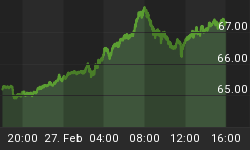Wall St. Pundits have summarily exculpated Ben Bernanke from the negative effects derived from artificial interest rates and massive increase in the Fed's balance sheet. Specifically, most market commentators now claim with certainty that the central bank's unprecedented manipulation of markets has been done without creating any inflation.
This assertion is untrue in every aspect. Most importantly, the Fed's quest to boost asset prices has been accomplished by creating credit by decree. In other words, Mr. Bernanke has purchased more than $2.5 trillion worth of MBS and Treasuries with newly manufactured money within the last five years alone. Therefore, there has already been $2.5 trillion worth of inflation that has been directly injected into mortgage and Treasury securities; and this number is still growing at a rate of $85 billion each month. This means the Fed is causing a tremendous amount of inflation to occur in bond prices.
Banks have taken the Fed's new money and purchased new assets including equities, MBS and Treasuries, which in turn has helped push interest rates down to record lows. Bernanke's debt monetization has sent stock prices up 140% from their lows and sent home prices rising 10.2% YOY on a national basis, according to the S&P/Case-Shiller Index. Inflation is very evident in stocks values and has now even caused real estate prices to jump.
This process of balance sheet expansion has caused the broad money supply M2 to rise 7% YOY. With real GDP growing at just 1.5-2% annual rate, the excess money growth is causing asset prices to rise.
But the major point here is the Fed has convinced many that re-inflating asset bubbles doesn't count as having produced any inflation. The best illustration of this point is the price of oil. Throughout the decades of the 80's and 90's the price of oil fluctuated around $30 per barrel. It started the 80's at $32 and began the new millennium at just $27 for a barrel of WTI crude. Starting in the mid-2000's, low interest rates, a falling dollar and Fed-engineered bubbles caused the oil price to eventually rise to $147 by 2008. Then, the Great Recession helped send the oil price back to $33 a barrel in early 2009. However, the Fed's quest for ever-increasing inflation has propelled the oil price back to $94 today.
This is how our central bank views inflation: keeping asset prices (in this example oil) more than 200% above its two-decade average doesn't count as inflation; it's just keeping asset bubbles from correcting. The same can be said about the equity market as well. Stock prices are at all-time nominal highs, which the Fed counts as a victory, and as such, Mr. Bernanke is disregarding the fact that they had previously been in an unsustainable bubble.
What's worse is the inflation debate isn't at all over. Money and interest rate manipulations courtesy of the Fed have allowed the government to amass a debt load that far outstrips its tax base. Therefore, since the tax base cannot support the amount of outstanding debt it will have to monetized in a more aggressive and permanent fashion. In other words, if you think prices are already killing the middle class and destroying your standard of living; just stay tuned, the worst is yet to come.















